#I just find the idea really funny that Nigel is A Little Bit Scared Of Tessa and attempts payback but it backfires a little
Explore tagged Tumblr posts
Text
TPN - “Dreams Come True”
What better way to cheer up the TPN fandom after the second season’s final episode than with the special exhibition chapter finally being fully translated. I caught glimpses of a few pages here and there over the past couple months but seeing all the children live happily together in the human world in their own little village that they made close to Emma and Alex warms my heart. Of course I would’ve loved if we got to see more of the GP Resistance (because the anime denied us of them) but following the GF kids around the world as they experience their dreams is fair enough. We started the series alongside them so might as well finish strong with them too. I really loved seeing everyone grow up but no matter how old they get or how much time passes, I’ll probably never get used to seeing Emma without her iconic “63194.” It’s a bittersweet feeling for me, but her smiles bring me so much joy and I’m beyond happy that she accepted everyone into her life as they accepted her without her memories.

I haven’t a clue on how much time passed since everyone found Emma in ch181 to now, but seeing her call out everyone’s names is a little detail that I love so much considering she had no idea who anyone was at first. Trying to remember 60+ names doesn’t seem like an easy task to me. No doubt I was just as shocked as our girl upon learning these mere children bought a goddamn plane! We learn in a couple pages that it’s because of Norman’s company that they can afford it, but still, he’s like 15 or 16 now? He’s still a child! And I’m impressed! Not only at him, but that Oliver and Violet became pilots as well! It’s especially cute when you remember that Lucas gave Oliver a little toy plane during their time at Goldy Pond.
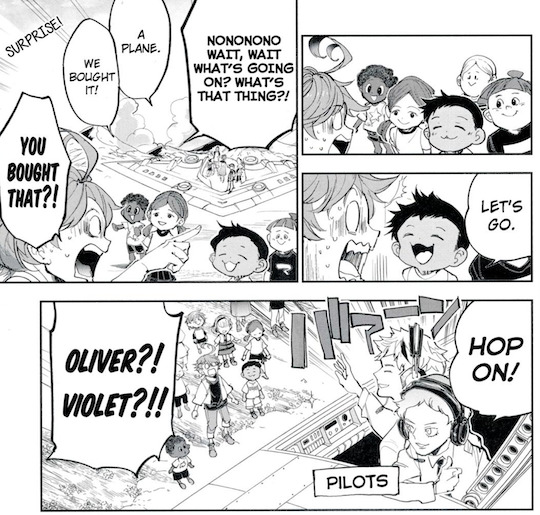
Speaking of GP, is it just me or does Emma’s current outfit resemble her GP one just a little bit? Sure we have no idea what color scheme this one has but come on, the short jacket, the dark shirt and jeans.. just imagine it! Jemima, Yvette, Alicia and Mark remade Gillian’s original GP outfit sometime before the Grace Field Raid arc (ch137 extra page) so I don’t doubt they could’ve done the same for Emma. Of course that’s just me being completely hopeful and missing the Goldy Pond arc to death but yeah! I’m also so happy to see Chris up and moving again! Seeing him wake up briefly in ch181 was nice but this is so much better. I imagine he and Emma have a lot to catch up on in terms of stories, with him being unconscious since ch105 and Emma not remembering anything.

But here we go, the original 15 escapees plus Norman, Phil, Sherry, I believe I saw Carol somewhere and a couple other random kiddos ready to see the entire world. They get to accomplish so much.. and in a single day too I believe? At least that’s what Phil and Alicia say a bit later about everyone’s wishes, but aahh what a lucky bunch. Hell, I’ll say we’re lucky readers too to be able to see such a great story. Can’t thank Shirai and Demizu enough y’all. I wish we got to see more of Alex though. He’s such a kind soul but I’m sure he’ll be just fine staying behind with everyone else.
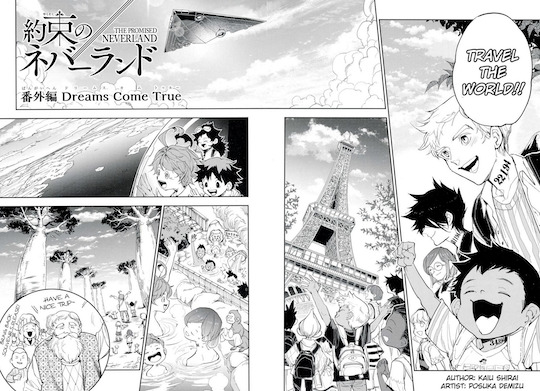
This entire page where we learn about Norman as a CEO is gold. I still can’t believe this child successfully built up an entire multipurpose company not only to help their search for Emma but also because he didn’t want to live off the Ratri clan. I wish I knew about this last week when writing out Norman’s birthday post because hell yeah this deserves some praise! AND he managed to graduate school as well during all that! Well, by skipping grades which totally makes sense. I mean, if he managed to pass all the Grace Field and Lambda tests effortlessly I’m sure normal human world school was a piece of cake for him. Holy shit dude, keep on impressing me why don’t ya. Not only him but Nigel and Sonya too! I’m not surprised that Vincent helped out but I’m glad those two got a tiny moment to shine as well! Ray is another obvious choice when it comes to helping Norman, as they’re best friends and he’s always been good with machines.. but boy, I can’t take you seriously when you’re just sitting there unamused and eating chips! Hahah I love him so much! And the fact he replies to Norman’s idea with just a simple “kay” is an eternal mood.
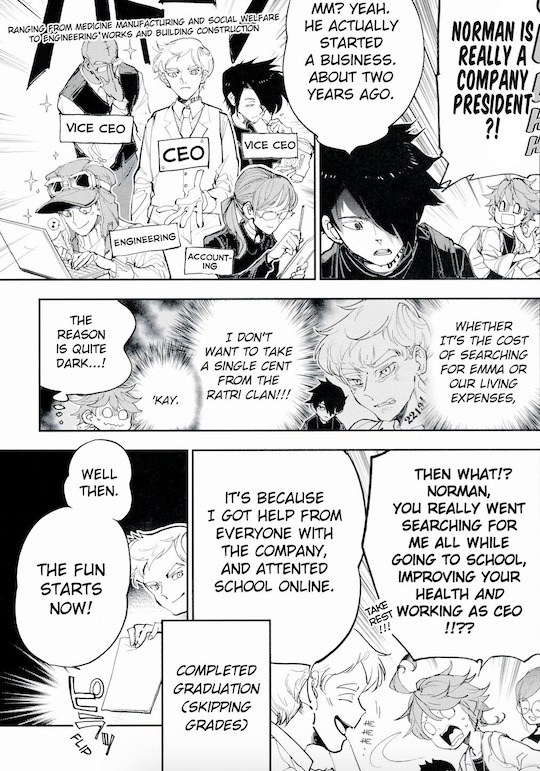
Okay boys aside, can we talk about our fabulous girls now? Because oh my god, they’re so darn beautiful! They’re more fashionable than I’ll ever be and it’s so cute how they drag Emma along to take advantage of the 3-for-1 deal. But our girl pulls off that sporty look so well! (r.i.p. goldy pond outfit ver2.0). I’m not at all surprised that Nat wanted to go see the opera. That's perfect for him and I’d like to think the anime did something similar with that one shot we see of him in the human world. We don’t see him in a theater like this but to me it looks like he’s on the streets of Broadway? At least that’s the vibe I get from it. I’m sure there was something music related on one of those signs.

I can’t get over how adorable all the children look and how happy they are fulfilling their wishes, even if some of them aren’t as extravagant as others. Like eating a fluffy pancake and a ton of ice cream? We can do that whenever we want. But for these kids, it means everything and they absolutely deserve to experience such simple joys like that after all the harsh nonsense they’ve been through. I also love how Ray continues to be such a great older brother by still looking out for them too. The fact he remains completely unfazed by the haunted house is perfect. This boy has been haunted by his own nightmares and demons his entire life, there’s no way a couple of lousy jump scares are gonna spook him. Though I do find it funny that Alicia and Rossi still manage to get scared while Yvette is having the time of her life. I can’t help but laugh at Thoma’s “Shirai face” as well.

I find it interesting that out of all the different kinds of exhibits they could’ve shown us while Rossi visits a museum, they give us dinosaurs.. like that seems so silly to me. Y’all have seen several demons in your young lives already and yet dinosaurs manage to amaze you too? God these kids are precious. And then our boy Phil finally gets to see and ride a train! Just look how happy he is! The poor kid can’t even sit still he’s so darn excited and I can’t help but smile with him! Thankfully the anime showed us this too.
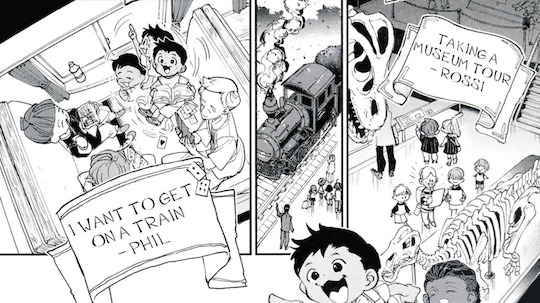
We eventually get to Ray’s wish and guys.. oh my fucking god. Tell me that this is not the absolute best and prettiest smile we get to see from him!! It honestly leaves me speechless okay? Ray never imagined he would ever get to see the outside world, let alone live past the age of 12, and yet here he is, seeing such a beautiful sight such as this, right in front of him instead of from inside a book. You can’t believe how happy and proud of him I am right now. Did you see how ecstatic I was when the anime kept Isabella alive? Multiply that feeling by ten and there ya go. That’s my level of happiness upon seeing my favorite boy smile like THAT! AAHHH!! That panel is gonna live rent free in my head until the end of time. I can’t get over how damn perfect it is. His smile is so pure and how he looks like he’s in complete awe is beautiful. He’s about to burst into tears and I swear I might do the same because I’m making myself emotional over this fantastic boy. Someone hold me.

No seriously, hold me because we’re about to get into some angst as we move onto to Emma’s wish. We all know that ever since 2039 her one dream was to ride a giraffe once they got outside, so here we are, about ten years later and the animals in question are within reach. Our girl should be totally excited, right? Ha, not quite.
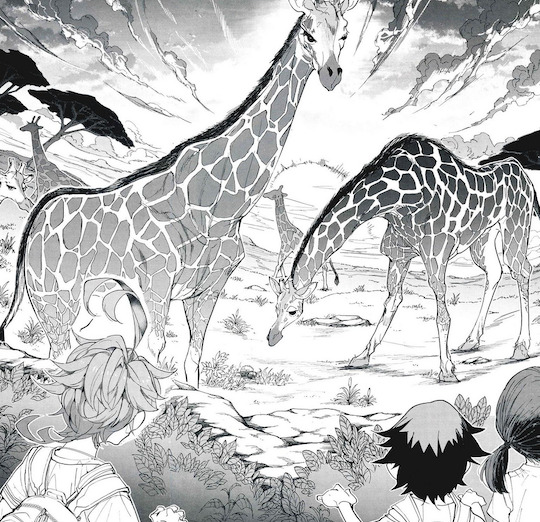
That wish was something the old Emma wanted, but since demon god had to be such a bastard, this Emma doesn’t know what to think, let alone what to even feel. She hasn’t experienced the same hardships as her family. She hasn’t gone through hell and back while holding onto that one wish that would make all the suffering worth it. The amount of joy everyone else felt upon living out their dreams, she wonders if she would be able to feel it too.

They brought her here to make her happy, but is this truly want she wants as well? This is old Emma’s wish after all. What about her and what she wants? Could this wish make her just as happy as her old self? She knows her family is only trying to help, but seeing her doubt herself does a number on my heart. Even without her memories, she’s still the same Emma deep down, as she doesn’t want to disappoint her family. She spends so much time worrying about living up to her family’s expectations, to try and be that Emma they all love so dearly.
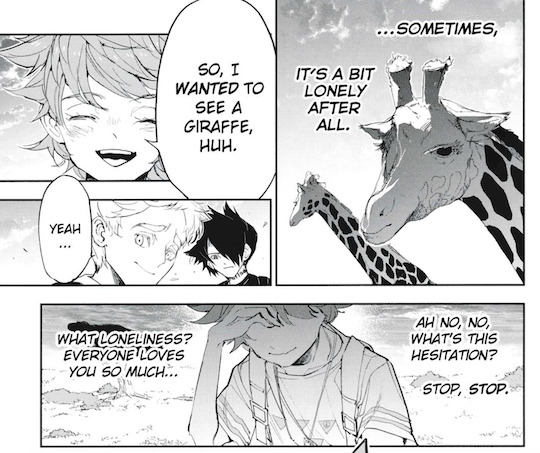
Little does she know that she acts the exact same as usual, almost as if nothing has changed when she finally expresses how much she wants to ride a giraffe. And that’s great considering when they first arrived at the giraffes, no on had even mentioned riding them. She came across that feeling all on her own and everyone else can’t help but laugh and feel relieved. Her mind may have forgotten but her heart remembers everything. There is no “old Emma” and “new Emma” to her family, just “Emma” and words can’t express how wholesome that is because they love her regardless. All that matters to them is Emma’s happiness because if anyone deserves to feel and experience that, it’s her.
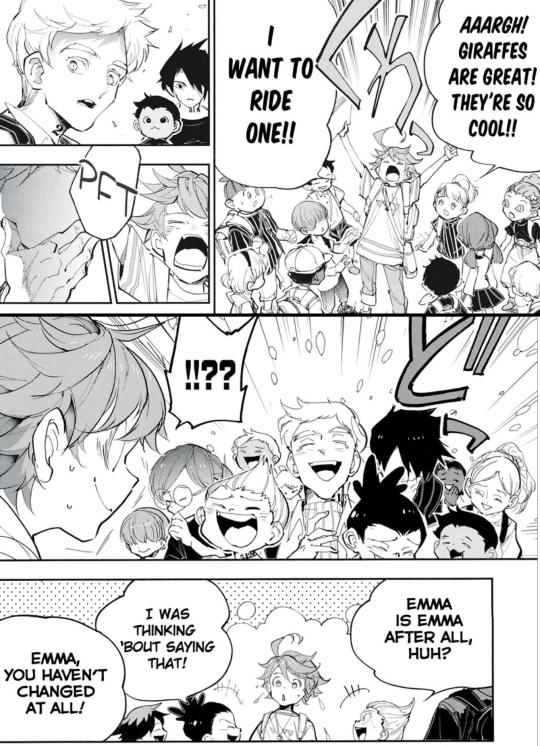
I just made myself tear up, damn it. I started this series with season one okay? I heard about this precious girl’s dream within the first minute of the first episode and here I am, a little bit over two years later, finally reading about it coming true and seeing that bright as hell smile on her face. Do you know how amazing it is to come full circle like that? My heart feels so full right now. I’m beyond proud of her and love her to death. Say what you want but I believe this to be the true manga ending in my eyes.

(damn this series for always getting me emotional)
#the promised neverland#tpn manga#tpn norman#tpn ray#tpn emma#norman#ray#emma#chidoroki used chatter
138 notes
·
View notes
Text
Under The Stars (G.D. fanfic) - Part 14 Tattoo Time
POV: First person
Word Count: 1313
*****
“That’s where you decided to get your first tattoo?” Ethan asked incredulously.
I furrowed my eyebrows at him. “You can’t talk, E. You get all yours on your thigh and ankles. You got one on the inside of your lip.”
He rolled his eyes. “Still not as painful as the shoulder blade area. You should do your arm first or leg.”
“Mmhm.” I sighed heavily. “But this is the tattoo I’ve been thinking about the longest. I want to get it first incase I decide I don’t want to get the rest.”
Grayson laughed beside me and played with my hair. “That’s a funny joke. You get one, you’re hooked.” He kissed the side of my head before getting up from the couch and leaving the space beside me vacant and lonely.
He reached his hand out for me to take. “Come on.”
I took it with a smile even though I had nerves surging in my body. I looked at Ethan. “Are you not gonna come with?”
“And miss the opportunity for some good video footage? Fuck no. I’m coming.”
I groaned internally as I crashed my face into Gray’s chest to hide the redness I felt creeping up. This is gonna show up on YouTube some day, or at least a form of social media. I know it.
***
I took a deep breath as we stepped through the door of the tattoo shop. We would’ve went to the boys’ tattoo artist but he’s back in Jersey, and I can’t take that much time off.
Gray squeezed my hand as Ethan pushed past us. “We got fresh meat bros!”
“Thanks for the intro, E.”
An average beefed man approached us with a sly smirk. “You’re the fresh meat I’m guessing?”
I was not expecting the slight hint of a British accent. Wow.
“Yup.” I nodded shortly.
“Good.” He chuckled and waved for us to follow him back to his station. “Where at and what?”
I pulled out a piece of paper from my back pocket. “On my left shoulder blade area.”
“Doin one of the first worst. Great idea.” I could sense of a bit of sarcasm, yet genuinity out of it. He stood up from where he had sat and walked off to do something. I think to transfer the design to the parchment paper.
Both of the twins were clearly amused by my anxiousness towards this. Honestly, once it starts I should be fine; it’s usually how it goes. Ethan had pulled out the Gopro and the lens pointed in my direction.
“The she-beast is finally getting her first tattoo. What do you have to say?”
I rolled my eyes and flicked him off. The front door opened, but I hadn’t looked to see who it was. A couple seconds later Chanelle approached. “What’s up, my dudes? How you feeling, Kat?”
She’d gotten her first tattoo a couple months back. I was the last one.
“Considering it hasn’t started? Nervous as fuck.”
“Good mindset.” She laughed and side hugged Ethan who kissed her cheek.
The tattoo dude came back and handed over the paper I’d given him. “I’m Nigel, by the way. Get comfortable. You’ll need to remove the straps of your tank and bra.”
I silently sat down on the black cushion and pushed the left straps down and took my arm out of them. Grayson rested a warm hand on the bare skin and pressed his lips on the area then underneath my ear. “It’ll be okay.”
I noticed I closed my eyes and focused on how his hand and lips felt on me. If somehow Grayson could distract me with sexual favors while I get this tattoo done, that would be awesome.
“Look back please. Tell me if this is good.”
I glanced back to see he was holding up a mirror and he held the angel wings design positioned over the shoulder blade area. “Just a little bit more to the left and it’s good. Thanks.”
He nodded. “Righty then.” He took out a disinfectant wipe to clean the area before sticking the design on to my skin. It’s a fairly simple design in black ink, so shouldn’t take long. I don’t think anyways. Even though I could hear the machine turn on and knew it was coming, I jolted a bit at the first poke of the needle.
Nigel snickered under his breath. “Sorry, should’ve warned. I’m starting.”
I couldn’t help laughing. “Great warning skills. I’m sure you’d be very helpful if there was a predator coming.”
“What kind of predator though? How much danger would there really be to warn people?”
“I don’t know. Hypothetically, what if zombies or vampires existed. They’re a high danger. Would you warn someone that a zombie was about to attack them?”
My three friends groaned aloud knowing what this conversation could turn into it. I was amused now and thankful for this distraction as he worked the stinging ink into my skin. I had to stop and cringe hard with tears in my eyes at some of the over bone parts, but it was over quicker than I was expecting.
“Man, I thought you were gonna cry like a little bitch the whole time.” Ethan stated, seeming disappointed or impressed?? Maybe both.
I shook my head. “Jealous? I think you’ll cry if you get one on your shoulder.”
He let out a deep breath. “Don’t think we’ll ever get the chance to find out. I’m too scared.”
All of us laughed.
Grayson shoved his shoulder. “Maybe this is a fear we should do for a video.”
“I’d rather swim with sharks again bro.”
“Okay, let’s do it. A part two.”
Ethan eyed Grayson to see if he was serious then stuck his hand out for a fist bump. “Since I’m a savage, okay.”
“Ethan, I think she’s taken the savage title from you.” Nigel joked.
I am completely amused. “Hah! Never thought the day would come.”
“Oh no. Nigel, you have anyone else coming in? Let’s get someone on a shoulder blade.” E whipped off the white muscle tee he was wearing and sat down on the black cushion.
Chanelle face palmed and sighed heavily. “For fuck sakes.” She looked at me. “Thanks, Kat.”
I smirked. “You’re welcome.”
***
I was dying of laughter. As much as Ethan wanted to take the title back today, he cried more than I did. But I still give him props, he had a filled in tattoo of a mountain done; it’s either go big or go home for these boys.
“Would you shut up?” He whined as we paid and left the shop.
“I just wanna milk this a little longer. It’s not every day I’m more savage than you.”
He hung his head down and shoved his hands into his pockets to walk ahead.
“Ethan, come on! I give you some props, you got a more intricate tattoo than I did, so I say you did pretty damn good.”
“Damn straight.” He shot back and hopped into the driver seat of his car to end the conversation.
Grayson snickered and looked at me. “How’s the tattoo feeling?”
For a moment, I was blown away by the sunset backdrop behind him, making him glow more. I cleared my throat and blinked a couple times. “It’s feeling good. Tender, obviously.”
“I’ll remind and help you later to remove the paper and put the lotion on it.”
I smiled. “Thanks, babe. I don’t think I’ve said it yet.. I’m really glad that all of you were here for this. I wouldn’t have ever done it.”
He captivated my lips sweetfully in a kiss for a brief moment. “I’m glad you let me be here for it.”
“You can be there for every single one. No doubt.”
His fingers brushed down my right shoulder and he was smiling like a complete dork. “I can’t wait.”
Next: First Time (Part 15)
#it's gonna be going on hiatus again#im sorryyyy#but rest assured it'll finish eventually#grayson dolan#grayson dolan fanfic#grayson dolan fluff#grayson dolan fic#dolan twins#dolan twins fanfiction#dolan twins fic#fanfiction#story#writing#UTS#Under The Stars#Part 14#Tattoo Time#ethan dolan
5 notes
·
View notes
Text
Transcript of How Ultralearning Helps You Master New Skills
Transcript of How Ultralearning Helps You Master New Skills written by John Jantsch read more at Duct Tape Marketing
Back to Podcast
Transcript
John Jantsch: This episode of The Duct Tape Marketing Podcast is brought to you by Klaviyo. Klaviyo is a platform that helps growth-focused eCommerce brands drive more sales with super-targeted, highly relevant email, Facebook and Instagram marketing.
John Jantsch: Hello and welcome to another episode of the Duct Tape Marketing Podcast. This is John Jantsch. My guest today is Scott Young. He is a learner and we’re going to find out more about what that means, but he’s also the author of a book called, Ultralearning: Master Hard Skills, Outsmart your Competition, and Accelerate Your Career. Scott, thanks for joining us.
Scott Young: Yeah, thanks for having me here.
John Jantsch: Let’s get your definition of ultralearning since that’s the name of the book.
Scott Young: Yeah, so ultralearning is this approach to aggressive self-directed learning and it really started from finding these people that just had these incredible stories. I document some of them in my book. People like Erick Barone who spent five years mastering all the skills of video game development to release a bestselling title or people like Nigel Richards who won the French world scrabble championship, even though he doesn’t speak French. They started by finding these really incredible examples of stories. I found that there was a general sort of approach to this and what it was is people who take self-directed aggressive learning products. Self-directed in this case means that it is initiated and driven by the person who’s doing the project so you’re learning something that you care about as opposed to the way that we think about traditional education where you just sit passively in a classroom. Then aggressive in this case has different manifestations, but the main way I want to think about it is that these people are focused on doing what works to learn even though that sometimes can be a little bit more difficult at first.
John Jantsch: We’ll break down aggressive, that’s a relative term but you shared. I saw you speaking at one of my favorite conferences in the world. I’ll give a shout out to World Domination Summit in Portland. You shared a story about how you embarked on your own kind of first ultralearning project. Maybe share that to give people a sense of the scope of what we’re talking about?
Scott Young: Yeah, the way that I kind of, and as I talked about in my speech that you heard is that I got into this by first uncovering one of the alternatives that I talk about who is Benny Lewis. He has a website which has become quite popular called Fluent in 3 Months where he takes on these projects to travel to a new country and tries to learn a language in as little as three months. I found about this about 10 years ago when I was living in France trying to learn French. It wasn’t going super well. I was struggling. Most of the people around me spoke to me in English and I was having difficulties learning French. It was uncovering his kind of philosophy towards learning where he was taking on these ambitious projects, but also going to somewhat unusual lengths to learn things.
Scott Young: This actually resulted in several years after that experience of trying to learn French actually went with a friend to do our own version of that project, which we called The Year Without English, where we went to four different countries, Spain, Brazil, China, and South Korea to learn Spanish, Portuguese, Mandarin, Chinese, and Korean. The method that we used was what we called the no English rule. When we landed in those countries, we only spoken the language we were trying to learn. The funny thing as I talked about in my speech that I gave is that when I say this to people, people are like, oh my God, that sounds crazy. Like, there’s no way I could do something like that. The funny thing I found is that because it was more effective, it was actually a lot easier than the approach that I’d taken in France.
Scott Young: This is what I wrote the book about is trying to show people these alternative approaches to learning hard skills and show that even though they can sometimes be a little bit more tricky right at the beginning, by using an effective method, you get so much better so much more quickly that you avoid a lot of the frustrations and pitfalls that normal learners face when they’re trying to learn things like languages, but also career skills, programming, all sorts of things.
John Jantsch: Well, and in fact, you also shared a story that you accomplished what was the amount or equivalent of an MIT computer programming degree in two years. I may have got that wrong, but essentially you also showed a giant pile of books. I think a lot of people hear stuff like this and they think, oh, ultra learning, it’s a hack to do it faster, but it’s still a heck of a lot of work, right?
Scott Young: Yeah. The way I’ve been trying to explain ultralearning is that, so there’s no secret, there’s no like, okay, well those are just some kind of weird trick that no one’s ever heard of before to learn things. I mean, there are lots of tools that are underused, so there’s a lot of little specific things that we could talk about that your learners could use to apply or your listeners could use to apply to learn better. I think the way that I think about ultralearning, and this is a recurring theme, and this is why I picked that word aggressive, is that very often something that is initially a little bit scarier or a little bit more frustrating is actually much more effective. The reason that a lot of these approaches are less common is because people won’t do the thing that actually works really well because it sounds like too much but if they were to actually do it, if they were actually pushed to do that or forced to do that, they would find it’s actually easier than they think.
Scott Young: They would actually learn a lot more effectively. There’s even some interesting research relating to this. One of the principles I talk in the book I call retrieval. Retrieval is this scientific idea that if you try to recall things actively from your memory so you don’t have the book open, you just try to close the book and try to recall it, you’ll remember a lot more when the test comes than if you just read notes or read things over and over again. One of the things that was interesting is that they took participants in this study and found that weaker performing students, so students who weren’t doing as well, they wanted to keep reviewing. They’re not ready to do practice testing, they aren’t ready to do this retrieval.
Scott Young: If someone forced them to do retrieval so that they weren’t allowed to do that review, they actually scored better on the test. This repeats a theme in the book and a theme that I try to say in my message that ultralearning isn’t magic. It’s not a secret. The reason that it works is because very often people are not aware that there’s these differences in how you learn things. Sometimes the more difficult, or I would say more initially difficult method is actually much more effective. If you can push yourself to do it, you’ll actually get better results.
John Jantsch: I think most people’s experience with learning goes back to the typical school curriculum book type of learning. I’ve heard you say that ultralearning gets you to the fun part of learning faster. What part is that exactly?
Scott Young: Well, I mean, when we start learning a new skill, there’s often feelings of inadequacy, fear of comparison with other people. Even I’m not immune to this. I recently started learning salsa dancing. I got two left feet. I’m not a very smooth dancer in any way. I remembered going in the beginning of the intro classes and I’m screwing up really basic stuff. I’m not keeping to the rhythm. I remember feeling bad. I’m feeling like, why am I doing this? Why am I putting in this effort when it just feels bad? I think this is what scares a lot of people off from taking on learning projects, learning to speak Spanish when they’ve always wanted to learn Spanish, or learning guitar lessons, or learning to program, or getting better at public speaking, or whatever matters to you. A lot of times it’s this feeling that you get in the beginning of learning where you feel inadequate that makes you reluctant to do this. What ultralearning is often about is about how do you get over those sort of, you kind of blow through those initial phases so you can get to the part where you’re like, oh actually I’m not bad at this.
Scott Young: As soon as you’re not bad at something, learning becomes fun because it is something you’re competent in. For learning a language for instance, when you start speaking Spanish, it feels awful because your ability is really low and people are, you know, “What? What did you say? I don’t understand.” You’re having a bunch of difficulties, but once you can have some minor conversations or you have some interactions where that person understood what you said and now it feels good, now you feel like, “Oh, this is impressive. I have this ability.” For me, ultralearning is often about like, how do you take something that does feel a little bit daunting and you compose it into some steps so you can get through that difficult, frustrating part so that learning stops becoming this chore and becomes this fun activity so that you just enjoy doing it.
John Jantsch: There’s so many people that give the advice of, you know, for people looking for a career or starting a business, “You should do something you love.” I think a lot of what you’re saying is you’ll love something you get good at. If you get good at it faster, that might be a way to actually make a career choice.
Scott Young: Absolutely. Yeah, definitely it’s the case that for a lot of people I think the things that we love are just the things that by happenstance we happen to get good at. For me, this book is not really just a book about learning but a book about finding more things that you love because when you’re good at more things, you love more things. For a lot of people they’ll say things to themselves like, oh, I hate math. Well you hate math because you were bad at math or because it was challenging or because you felt like, “Well, I worked really hard and I only got a B on that exam.” If you were really good at math, if people constantly gave you feedback about how smart and how clever you are, I mean there are people who are like this. I mean, they’re not the majority but they love math. It’s the same thing with lots of skills. I’m not saying you have to learn math, but if you understand the learning process, understand what you need to do to get good at skills, you can love all sorts of things even if you feel like you’re bad at them right now.
John Jantsch: You brought out the, and I’ll use your Canadian process word, is there a specific process for ultralearning?
Scott Young: Yeah, the way I broke down the book was into nine principles. The reason I focused on principles is because in many ways what I’m trying to do is to get people away from the ways of thinking about learning that have held them back in the past. One of those things that I think that has held people back in the past is that there’s one right way to do everything and then you try it. If it doesn’t work for you, then the problem is you. The right way to think of it is that there are many, many, many different ways to learn the thing that you care about as long as you are paying attention to what are the principles of learning. There’s often very different ways you can go about things and still get to the same result.
Scott Young: The first principle and really the starting point for any learning project is what I call metalearning. Metalearning is just a fancy term. Meta usually means when something’s about itself. Metalearning means learning about learning. In this case, what that means is that if you’re going to learn a new skill or subject, it often pays dividends to spend about an hour or two online doing some research of how do other people learn this skill? What are the pitfalls they have? What are the things that people struggle with? What are the resources they use? As you go through this, you’ll find lots of different options because pretty much any popular skill has many, many tutorials online, many different perspectives on the right way to learn it. You can use that as a starting point. Then of course, the other principles that I have.
Scott Young: There’s eight more principles in the book, it can also provide guidance so you can help choose methods that not only suit you and your schedule and your lifestyle and your personality, but also fit within the overall principles of learning so that you will make sure that you don’t get derailed and you don’t spend six or seven months working on something only to find that it didn’t get you the results that you wanted.
John Jantsch: Want to remind you that this episode is brought to you by Klaviyo. Klaviyo helps you build meaningful customer relationships by listening and understanding cues from your customers. This allows you to easily turn that information into valuable marketing messages. There’s powerful segmentation, email autoresponders that are ready to go, great reporting. You want to learn a little bit about the secret to building customer relationships. They’ve got a really fun series called Klaviyo’s Beyond Black Friday. It’s a docu series, a lot of fun, quick lessons. Just head on over to klaviyo.com/beyondbf, Beyond Black Friday.
John Jantsch: Here’s a question that I’m sure you probably get occasionally. I mean, aren’t there some people just smarter than other people? I mean, they’re going to learn something that’s more complex than others or is that really just a limiting belief?
Scott Young: Well, I will say this, I do believe that there are different people who have different talents. That even within individuals, we have things that we’re good at, that we’re bad at. Some of that is related to experience. One of the things I talk about in my book is that very often what people misconstrue as being innate talent is actually a difference in prior experience. For me, for instance, I felt really crappy in my French class 10 years ago because I was near the bottom of the class. It was only after talking to people for a while that I realized, oh actually these people have studied French for longer than I have. In the beginning, my negative feelings were thinking, well, I’m just not as good at this but really it was that they had more experience. Similarly, I think a lot of us can often go into let’s say a computer programming class and not realize that the wiz kid who seems to be so smart is actually been doing it since he was five and that’s why he’s so good at the class and why you’re struggling. That would be the first thing I would say.
Scott Young: The second thing I would say is that yes, there are differences in talent. I think that that should also make you not feel bad if you feel like you’re going slower than someone else. If you’re learning something that’s taking a little bit longer, that’s perfectly fine. However, there are large differences that you can get from using the right method. Often I find that what happens to us is that the things that we feel we are good at are usually the things that just sort of by chance we ended up using a really effective approach for learning it and so we think of ourselves as being really good at it, but it was really more just, you unwittingly use these principles of learning.
Scott Young: I wanted to lay them out in the book so that you can see something that you’ve tried in the past and maybe struggled with and see yourself, “I was doing this and that’s why it was so hard for me.” That’s what I want to do with this book is not to deny that there’s any differences between people and everyone’s equally talented. Because if you look around the world, that seems to not be the case, but definitely that the potential you have and the amount that you can get better and especially on things that you have not done well in the past is much larger I think than most people believe.
John Jantsch: You have large swaths of this book talking about career advancement. Would you say that this is, if you want to advance your career, adding things that you can do, being able to speak another language. Your company is global and so now you have an option to work over here and you can program computer languages now and things. I mean, would you say that that, I mean, it just makes sense as a way to advance your resume if you will.
Scott Young: Absolutely. The way when I was doing the research in the book, one of the things that came up was this phenomenon known as skill polarization. We all know that income inequality is rising. I mean this is what every news report tells us, that the rich get richer. If you actually dig into this, and this was done by the economist, MIT economist David Autor, you find that there’s actually two different things going on. What’s happening is that the incomes are being stretched out at the top of the distribution and they’re being compressed at the bottom. The right way to view this I think is to imagine that the middle class lifestyle that we’ve all kind of been culturally conditioned is sort of our birthright, that’s what’s disappearing. That’s what’s getting squeezed into the bottom or spread out at the top.
Scott Young: Part of the reason for this is that computers and automation and technology are coming and they eliminate jobs and while they create new jobs in their wake, a lot of those new jobs are more complicated. At the same time, tuition is getting much more expensive. Going back to college or even if they do teach things at college, they often don’t, going back to school is often not the most responsible option just because the cost is so high. For me in writing this book, I realized that learning in this way or learning skills, this is not just a frivolous thing just for learning a language or guitar, but really a process for getting really good at anything you care about. Whether that thing is again, learning a new computer programming language, getting really good with Excel, learning public speaking, getting good at marketing, getting good at communication, getting good at leadership, these are all skills.
Scott Young: These are all things that you get better at them by learning, not necessarily learning through a book or a textbook. I’ll talk about in ultralearning that often the way that we think about learning that way is wrong. But it’s definitely something that I would approach differently. I think if you can view your career in this light, that your success in your career depends at you being good at things I think that that obviously fits into this picture of ultralearning.
John Jantsch: I will give you your opportunity to be polarizing yourself here. Is college just not cutting it?
Scott Young: Well, I will say this because this is one of the things as well. A lot of people when I wrote this book were saying, “Are you going to say that this is the alternative university?” In some ways it isn’t, not because college is often super great but because there are certain professions or certain career paths where having a degree is necessary. I mean, if I’m going to become a lawyer, I can’t just ultralearn law and then go practice it. I mean, people are going to expect me to have a degree and it’s actually not even legal to practice a lot of professions without college education. The right way to think about it is that a lot of what we are expected to know and be able to perform in our jobs and in our careers is not going to be something taught in school. For many of us, what you actually do on your day to day job is very unrelated to the thing that you actually learned in school.
Scott Young: Where do you learn to get good at that? You learn it by doing, working on the job and by doing projects like these. Then also, I think in many ways college is not cutting it because it is kind of becoming increasingly divorced from the actual realities of the workplace. In many cases there are these issues of transfers. One of the most extensively studied problems in the educational psychology literature is this problem of transfer. That you teach things to a student in a classroom and they just can’t apply it to very obvious situations in real life. Often that’s the way we teach and often that’s just sort of a symptom of the education system in general but that’s definitely a big problem if you spend four years in school and all of that knowledge that you learned is useless when it actually comes to doing the job.
John Jantsch: All right, I want to start my own ultralearning project and of course I’m going to go buy Ultralearning by Scott Young when it comes out. How would I go about getting started? How do you advise people to start an ultralearning project?
Scott Young: As I said, the starting point is always this metalearning. It’s always trying to figure out what are the possible default or starting points for learning things.
John Jantsch: Let me back up a little before that. How do we decide even what to learn?
Scott Young: Okay, good question. There’s two reasons you might want to learn something. The first is an intrinsic project. This could be like, I’ve always wanted to learn Spanish or I’ve always wanted to know how to program computers, or I’ve always wanted to be able to play the guitar, give beautiful speeches, or what have you. If you’re starting with an intrinsic project that’s just sort of what inspires you and often that’s how these projects come about is that they become useful skills, but they start from a different point. The other way that you can start a project is that you actually want to do something. I think this is very relevant because learning is really about bridging the gap between what you can do right now and what you could do if you were able to acquire new skills. Often what it is is not, well I want to do some learning project, but I would like to change careers, or I would like to write a book, or I would like to become a presenter, or I would like to do something that is outside of my realm of ability right now.
Scott Young: When you’re doing that, the next thing to do is to say, well how would I be able to do that? Often it can be a project to do that thing or to get better at it. If you want to get better at writing a book, you might start with a project of writing a book, but that’s usually the starting point of, okay, well I’m going to try to write this book. How do I get good at the skills involved in writing? You might develop some things around practicing, some things around trying to improve your writing ability, of identifying components that you’re going to work on in practice. There is some nuance to that, but definitely I think that’s a useful way to think about it is that a lot of the things that you want to accomplish that you don’t feel like you can right now, think of those as learning projects rather than just, well yeah, I don’t know how to do that. I can’t do that. Right?
John Jantsch: Scott, where can people find out more? Of course, the book will be out everywhere that books are sold in August of 2019 depending on when you’re listening to this, but where can people find out more about you and your work with Ultralearning?
Scott Young: Absolutely. You can go to my website at scotthyoung.com, that’s S-C-O-T-T-H-Y-O-U-N-G.com. I have over 1,300 articles that have written there over the last 13 years on all sorts of subjects including learning. Of course they can check out the book. If you just Google Ultralearning or you go to Amazon or Barnes & Noble’s or wherever you get your books from, you can find the Ultralearning book. You know what? If anyone who is listening now ends up getting the book and applying it to learning a skill that they care about, I would love to hear about it so please send me an email if you get a chance.
John Jantsch: You’re collecting ultralearning success stories, aren’t you?
Scott Young: I would love that. Yeah.
John Jantsch: Maybe I’ll come up with one of mine. I’m not sure I can fit much more in my brain, but maybe I’ll come up with one and I’ll be one of your case study. Scott, great visiting with you and hopefully I’ll run into you in beautiful Vancouver someday.
Scott Young: Yes. Thank you so much for having me.
from http://bit.ly/2TaqZu7
0 notes